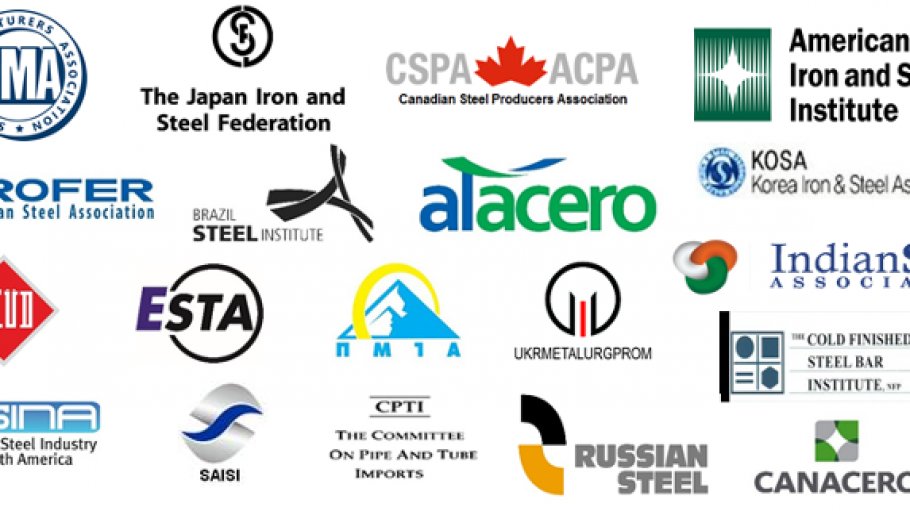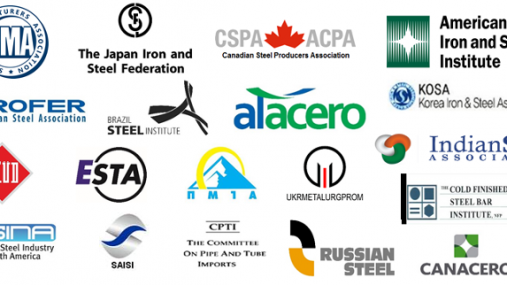
Press releases » Global steel industry groups call for urgent action on steel excess capacity crisis
Global steel industry groups call for urgent action on steel excess capacity crisis
Downloads and links
Recent updates

Nineteen steel industry associations in the Americas, Europe, Africa and Asia today called for the governments of steelmaking economies to step up efforts to effectively tackle persistent global excess capacity in the steel sector, including by quickly implementing strong rules and remedies that reduce excess capacity, its impact and its causes. The industry groups emphasized that governments should use all available mechanisms and negotiation forums, including the G20 Global Forum on Steel Excess Capacity, to:
The industry groups commended the September 30, 2019 statement by Ulf Zumkley, Chairman of the Organization for Economic Cooperation and Development’s (OECD) Steel Committee, which expressed grave concerns about the unexpected growth of new steelmaking facilities in 2019, exacerbating global excess capacity and contributing to trade tensions. Participants in the OECD Steel Committee reiterated the need for further capacity reductions in relevant steel-producing economies and urged members to extend the G20 Global Forum on Steel Excess Capacity past its current expiration in 2019.
“We are grateful for the efforts made to date by the G20 and OECD governments to address excess capacity, and to support a playing field at the G20 Global Forum on Steel Excess Capacity and OECD Steel Committee,” the industry groups said. “Unfortunately, effective reductions in capacity and concrete actions to remove government measures that distort markets, including raw materials markets, have not been adequate to date. Efforts by governments to eliminate practices that lead to excess capacity should be redoubled. We are hopeful that the diligent efforts of Japan, the current G20 Chair, are successful in extending the G20 Global Forum on Steel Excess Capacity beyond 2019, and we urge all G20 and OECD steelmaking economies to pursue all vigorous means to obtain substantive results on the critical problem of steel excess capacity.”
The steel industry groups issuing the call for urgent action include representatives of: Steel Manufacturers Association (SMA), American Iron and Steel Institute (AISI), EUROFER (European Steel Association), Canadian Steel Producers Association (CSPA), CANACERO (the Mexican Steel Association), Alacero (the Latin American Steel Association), Brazil Steel Institute, Turkish Steel Producers Association, Republican Association of Mining and Metallurgical Enterprises (AMME), The Japan Iron and Steel Federation (JISF), European Steel Tube Association (ESTA), Korea Iron and Steel Association (KOSA), Specialty Steel Industry of North America (SSINA), South African Iron and Steel Institute (SAISI), The Cold Formed Steel Bar Institute (CFSBI), Association of Enterprises UKRMETALURGPROM (Ukraine), Russian Steel Association, Indian Steel Association, and The Committee on Pipe and Tube Imports (CPTI).
***
Contacts:
SMA – Phil Bell, bell@steelnet.org, 202.296.1515
AISI – Lisa Harrison, lharrison@steel.org, 202.452.7115
CSPA – Catherine Cobden, c.cobden@canadiansteel.ca, 613.238.6049
CANACERO – Salvador Quesada, squesada@canacero.mx, 52 (55) 5448-8162
EUROFER – Charles de Lusignan, charles@eurofer.be, 0032 2738 79 35
Alacero – Fernanda Valente, fevalente@alacero.org, (55 11) 3195-5803
Brazil Steel Institute – Débora Oliveira, debora.oliveira@acobrasil.org.br, 55 (21) 3445-6327 | 6300
JISF – Shigeru Hagiuda, hagiuda@jisf.or.jp, 81 3 3669 4835
Russian Steel – Maria Simonova, info@russtal.ru, 79153226225
CFSBI – Mark Redding, mredding@bargrind.com, 630.868.1234
Turkish Steel Producers Association – Veysel Yayan, veyselyayan@celik.org.tr, 903124663734
ESTA – Dominique Richardot, esta.dr@orange.fr, 33 1 41 31 56 45
AMME – Alisher Zholdybayev, zholdybayev@agmp.kz, 7 7172 689 601
SAISI – Charles Dednam, charles@saisi.org, 27 12 380 0900
KOSA – Min-Chul Lee, minchul.lee@ekosa.or.kr, 82 02 559 3501
Ukrmetalurgprom (Ukraine) – Oleksandr Kalenkov, office@ukrmetprom.org,0442790525
SSINA – Larry Lasoff, LLasoff@kelleydrye.com, 202.342.8530
CPTI – Tamara Browne, tbrowne@schagrinassociates.com, 202.223.1700
Indian Steel Association – Arnab Kumar Hazra, a.hazra@indsteel.org, 919958599032

Download files or visit links related to this content
Strasbourg, 17 December 2025 – The European Commission’s latest proposals on the Carbon Border Adjustment Mechanism (CBAM), unveiled today, correctly identify several loopholes that risk undermining its effectiveness, notably regarding EU exports, downstream sectors and circumvention practices. However, despite these laudable efforts, the measures put forward fail to deliver a comprehensive and durable response to carbon and jobs leakage, warns the European Steel Association (EUROFER).
A milestone occasion to quickly and effectively restore affordable electricity, to relaunch the
decarbonization and strengthen the international competitiveness of the European steel
industry.
Brussels, 02 December 2025 – Unchanged negative conditions – U.S. tariffs and trade disruptions, economic and geopolitical tensions, protracted weak demand and still high energy prices – continue to weigh on the European steel market. EUROFER’s latest Economic and Steel Market Outlook confirms for 2025 another recession in both apparent steel consumption (-0.2%, unchanged) and steel-using sectors (-0.5%, revised from -0.7%). A potential recovery is expected only in 2026 for the Steel Weighted Industrial Production index (SWIP) (+1.8%, stable) and for apparent steel consumption (+3%, slightly revised from +3.1%) – although consumption volumes would still remain well below pre-pandemic levels. Steel imports retained historically high shares (27%), while exports plummeted (-9%) in the first eight months of 2025.